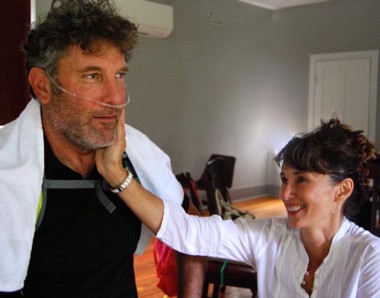Both of Chester Theatre Company’s first two summer productions pose a geographic puzzle. The first one, Madagascar, takes place mostly in Rome. The second, Annapurna, which opens this week, is set within sight of a mountain peak, but in Colorado, not Nepal. What’s more, in each play a central figure, a young man who never appears onstage, nevertheless hovers over the action. In both cases, it’s a young man whose absence deeply affects one or more of the characters. In the first play he is desperately longed for; in the second, he’s dimly remembered through a veil of resentment and remorse.
Madagascar is so named because it was an obsessive interest of the young man in question, who has mysteriously disappeared. In J.T. Rogers’ ambitious, elusive, time-slipping play, his sister, his mother and his mother’s lover offer us glimpses of his and their own lives in alternating, interweaving monologues that embody this question: what happens when someone who’s been an intimate, essential part of your life suddenly vanishes?
Rogers’ plays deal with deep-seated, primal emotions, often unacknowledged. This one is suffused with guilt, denial and a black hole of loneliness and isolation. The gulf between the characters and their outlooks is emphasized in the script, and on Chester’s almost claustrophobic stage, by the fact that the three never address each other directly. They share the same space—at times the same room—but they are separated by time, so that even their occasionally overlapping dialogues are addressed to the air.
The disconnect was further underscored in Chester’s production by three performers with quite different acting styles and affects. Kim Stauffer, a smart, visceral actor, brought a passionate poignancy to the role of the missing man’s sister. Debra Jo Rupp used her perky/ironical flair to play against the mother’s growing anxiety. And Paul O’Brien gave an understated portrait of a suit-and-tie man caught by unexpected feelings.
Annapurna is one of those forbidding Himalayan peaks that entice and devour mountaineers. In Sharr White’s play, it’s a metaphor for the summit of helpless desire that destroys those who would attempt it. It’s also the title of an epic poem whose author, named Ulysses, is a “defiantly impoverished” cowboy poet nearing the end of a long voyage of self-denial and despair.
The play begins as his long-estranged ex-wife, Emma, shows up unannounced at his dilapidated trailer home, and ends after a day spent unearthing old grievances and reviving old insults—two wounded warriors trading witticisms dipped in bile while circling around the central sore spot, the son she took away when she left him 20 years ago.
Chester Theatre Company celebrates its 25th season this summer with a series of special events and promotions. To the twice-weekly audience talkbacks with Artistic Director Byam Stevens are added panel forums on themes and issues associated with each play (Annapurna’s, following this Sunday’s matinee, considers “The Difference Between Love and Care”). CTC’s strength and uniqueness rests on thoughtful productions of thought-provoking scripts—contemporary plays that embrace complexity and often repay repeat viewings. With that in mind, the theater now offers the opportunity, if seats are available, to come back and see the same show again for free.•
Annapurna, July 10-20, 15 Middlefield Rd., Chester, 354-7771, chestertheatre.org.
Chris Rohmann is at StageStruck@crocker.com and his StageStruck blog is at valleyadvocate.com/blogs/stagestruck.



